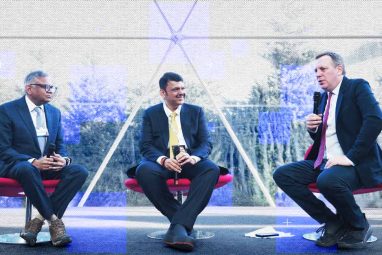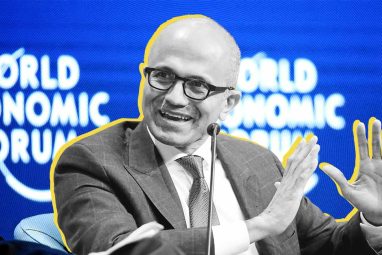Rivalry today is between connected ecosystems, Dassault Systèmes CEO says
At the opening of Dassault Systèmes’ expanded Pune campus, CEO Pascal Daloz said the edge now comes from platforms and partners working as one, with India positioned to carry more core R&D and global delivery.
News
- Microsoft Rolls Out Maia 200 AI Chip to Cut Reliance on Nvidia
- Google.org Funds 12 AI Projects to Accelerate Scientific Research
- MIT Sloan Management Review India, IDfy to Release Study on Data Privacy
- India’s AI Summit to Draw World’s Top Tech Leaders This February
- Startups Seek Tax Clarity After SC Ruling Against Tiger Global
- Tata Vows $11 Billion for Innovation City Near Navi Mumbai Airport

Competition is shifting from standalone firms to connected ecosystems, said Pascal Daloz, CEO of French enterprise software maker Dassault Systèmes, at the inauguration of its expanded Pune campus on Tuesday.
“It is time for India to become a giant,” Daloz told MIT Sloan Management Review India at the inauguration. “The competition of the future will be between ecosystems, not individual companies.”
The firm, which builds the 3DEXPERIENCE platform and virtual-twin tools that help manufacturers, builders, and life-sciences firms design, simulate, and manage complex products and operations in 3D, said its new “EARTH” block adds around 2,400 seats, taking its capacity in Pune to about 7,100 by 2030.
The firm describes virtual twins as science-based models that connect design and engineering data to real-world operations so teams can test scenarios, cut defects, and compress time to certification.
Daloz said the expansion is intended to plug India’s talent and partners into a shared platform so ideas move faster from design and simulation to production.
Deepak N. G., who leads the India business, said the focus is manufacturing, infrastructure, and life sciences, and that the goal is to act as a digital backbone for big OEMs as well as startups, academia, and policymakers.
Sudarshan Mogasale, who heads Dassault Systèmes Solutions Lab India, said the India teams have worked on innovative programs “for India as well as for global” from the start, not low-end outsourcing.
The buildout in Pune is the latest step in a three-decade India story that accelerated when Dassault took full ownership of 3DPLM Software Solutions, its long-running joint venture with Geometric.
That transaction deepened the company’s engineering footprint and positioned Pune as a critical node in product development and services. Local filings and ratings notes from that period underscore how central India has been to the firm’s global delivery network and R&D pipeline.
Operationally, the company is framing Pune as a place where customer work, core product engineering, and partner ecosystems intersect. That matters for managers because the advantages of an ecosystem strategy tend to show up in cycle time, quality, and rollout reliability.
Dassault’s own positioning ties the India ramp to its push on virtual twin programs in regulated sectors, where modeling and simulation can remove rework and help teams hit compliance targets faster.
Daloz pushed back on a simple displacement narrative around automation, saying “AI capabilities can upskill the workforce significantly,” and pointing to Pune as a site where human expertise and automation are combined inside customer programs.
He argued for “design in India for India and for the world,” adding that India needs to grow purchasing power and a deeper internal market so domestic demand shapes product road maps.
On revenue, Daloz said he is confident the India operation can reach $1 billion over time, characterizing the figure as a marker of India’s scale and the company’s commitment rather than formal guidance.
Public disclosures do not break out India revenue, and the company’s broader outlook centers on steady subscription growth tied to the 3DEXPERIENCE platform and rising virtual-twin adoption.





